8:56.30N
79:33.51W
Monday
28th May – Balboa Yacht Club
Well, the waiting went on for a bit – but not much more of a bit
than we’d expected. The admeasurer
(sorry- can’t help you with the ‘admeasurer’ term but his job is to certify the
relevant measurements of the boat) came aboard, as last indicated, on Tuesday
15th May. You may recall
that it was going to be quite a bit earlier than that. Then it became somewhat later and then
some. But, our having been there a
mere five and a half days, he graced us with his presence.
He was a charming bloke and in the space of half an hour or so had
established that a Swan 46 was a monohull ‘sailboat’ and less than 50’ in
length. OK, we’ve got all sorts of
documentation that says that but you just can’t be too careful! And, Jon, having last been called upon
to demonstrate his limited musical talents on a ukulele in Rodney Bay moons ago, was now
called upon to do so on a foghorn. Then there was all sorts of
stuff about holding tanks (about which nobody felt it appropriate to enquire
further come the ‘event’ - as
t’were), diesel tank capacity, range under engine and the like and enquiries
about the food we would be providing the pilot (actually; advisor). Apparently sandwiches for lunch were not
acceptable whilst the makings on a plate accompanied by slices of bread
were. In fact, sandwiches were just
what was required at the appropriate times and were wolfed down. Don’t tell anybody – it’s just between
you, us and the www!
Now,
what with the ideas around holding tanks and sandwiches, we haven’t been
religiously chronological so far.
So; let’s get there or thereabouts.
Shelter Bay Marina was just fine. It’s a little limited in what it can
offer but that just happens to be a lot more than anywhere else in the
vicinity. The staff are helpful and
generally the services are good.
They make an effort and lay on a daily bus or two to the supermarket on
the outskirts of Colon.
Sadly, parts of Colon live up to its anatomical name and one
feels desperately sorry for those that have to live there. There is disrepair, rubbish and litter
everywhere. The town hasn’t really
recovered from the completion of the canal nearly a hundred years ago when
thousands of workers were suddenly out of work. The situation was compounded in 1999
when the Americans left, handing the Canal Zone
back to the Panamanians and even more jobs disappeared. Shelter Bay
Marina is itself a legacy of the American era as
it is located in the middle of the remains of Fort Sherman which was abandoned almost
overnight.
The
weather in Shelter
Bay was pretty tricky. It was extremely hot and humid (hooray
for the outdoor swimming pool), interspersed with tropical thunderstorms and
accompanying serious downpours that advertised their impending arrival with a
few minutes’ notice. Launched
rubber dinghies became paddling pools in a matter of minutes. Come the evening the mosquitoes and
various other aggressive bugs came out to play – big time. Oh, how Jon regretted wearing out his
father’s beautiful leather-soled, unlined yellow suede mosquito boots a zillion
years ago because they were just the trendiest things imaginable in the
1970’s. But; there weren’t many
mosquitoes in England, even in those dark
ages. Before going to bed in
Shelter
Bay you really did need to
squirt on the anti-bug stuff. Even
a single sheet was often too hot to have covering you and bare skin unadorned
with anti-bug stuff meant party time for the little darlings. Fortunately, the other biting creatures
in the marina, didn’t make it aboard – a couple of crocodiles (or, possibly,
caymans or whatever) were sometimes spotted at night.
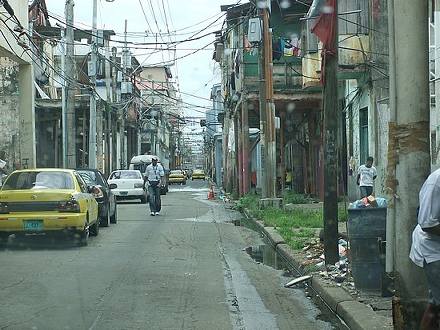
Many of the streets in Colon looked like this

Abandoned US military quarters in Fort Sherman in which Shelter Bay Marina is
located. No names, no pack drill
but we can think of one or two UK Army MQ patches in a worse state of
repair! Admittedly the grass tends
to be a bit shorter.
Our time in the marina was enlivened by the presence of the Clipper
round the world race fleet of ten 67 ft yachts which meant 180 extra crew of all
ages and many nationalities – many of whom had never sailed before. The bar and restaurant couldn’t always
cope and often some of the crew helped out. Their stay was longer than intended as
one of the boats had a broken gearbox. The spare being flown out got lost in
transit so someone had to fly out accompanying another. So, the fleet was about to go tomorrow -
definitely - for several days.

Some of the Clipper race boats – note dark sky, often the start of a
violent thunder storm.
Even
at the latter end of the Caribbean sailing
season, one meets a lot of like-minded cruising people who make life a great
deal of fun. In particular we have
to mention fellow OCC members Joseph and Marci Paravia from California who, having
been cruising for the last 10 years or so, spared no effort in educating and
equipping us for our Pacific journey.
And, a most entertaining couple they were too. Friends for life we hope. Marci also has a fearsome camera and the
talent necessary to catch you (at an outrageously long distance – Marci, we need
to speak about privacy protocols anon) wobblin’ around the masthead in the
bosun’s chair faffin’ about with whatever.
As I say; outrageous. And,
if a chap can’t have a bit of quiet time up the mast it’s a poor show. But, at least the 9’ length
of 15mm cylindrical fibre-glass sail batten now being used as a burgee staff
might stop the burgee being eaten as quickly as the last two. It’s those wretched aerials that do
it.
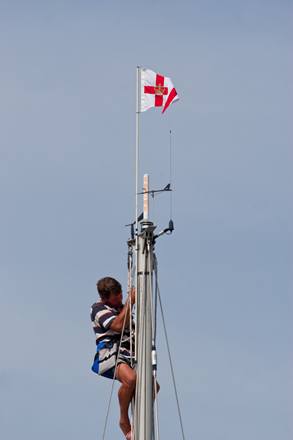
Jon switching halyards around.
Swappin’ yarns with the mast.
Because it is late in the season for passing through the Panama Canal we, along with others, found it difficult to
find yotties who could commit to line-handling for us. Those who offered to do so were faced
(as we had been) with the prospect of being put through several days before the
planned date. Since we’d
taken that bait and had then been put through a day later than planned we were a
touch sceptical about their chances but . . .
Given the uncertainty, we hired 3 line handlers from our agent at
$90 a go. He also produced the
required four 125ft lines and twelve tyre fenders. Three young men turned up before midday
on Friday 25th May and we set off to anchor at The Flats off
Colon at around
1320. We were there by about
1400. And of course, the Advisor
(pilot) pitched up about 30 minutes late just after 1600. So, why were we that
early? Because, of course, we’d
been told by the agent that the timings might be brought forward and it was our
problem if they were. Umm . .
.
Anyway, as soon as our Advisor turned up we set off towards the first set
of locks. The hired line handlers
did more or less what they thought they were supposed to do during the course of
the next day or so. However, we did
discover one or two significant holes in their knowledge (small stuff like how
to tie bowlines and how to use a cleat to sweat in or release tension on a line
inside the lock) but we got there without any damage. Jon did conduct a bowline tying class
for all three (characteristically ignoring the protests that this was
unnecessary) on the evening of the first day of the transit having had to retie
several knots that were an imaginative combination of grannies. Next day, oddly enough, all loops
in warps were recognisably bowlines.
Throughout the transit, whenever we were in locks {going up in the Gatun
Locks (Atlantic end) and down, in and between, the Pedro Miguel and Mirafores
Locks (Pacific end)} we rafted up,
3 abreast, with a 52.5 ft GibSea in the middle and a catamaran on the other side
of the GibSea. Having
transited the 3 Gatun Locks we tied up to a buoy for the night (massive rubber
thing to which you took bow and stern lines to lie alongside it beam on. A bit unusual but there we are). There had been talk of yachts transiting
overnight. That had been tried
earlier in the year but it was found to be far too dangerous. The big ships simply couldn’t make out
the diddy yacht lights amongst all the other lights around and they were passing
these things with yards to spare.
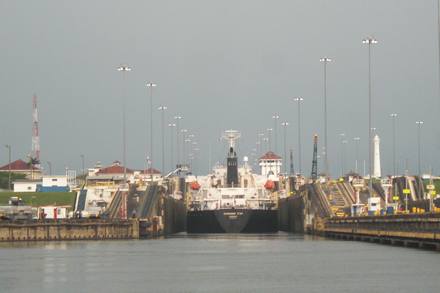
The cargo vessel with which we shared the Gatun Locks
On our way out to the anchorage at the Flats from Shelter Bay
Marina – a couple of miles – Jon had noticed that Mr Perkins seemed to be
running a bit of a temperature. The
coolant temperature dial, which normally steadies at 85ºC had risen to
100ºC. But, once we’d idled for a bit, whilst
the anchor was going down, it dropped to its normal setting. So, maybe it was a bit of a blip and
perhaps the thermostat had temporarily forgotten to open. By the time we got to
the first lock it was again up at 100ºC and occasionally
110ºC. And, it wasn’t steady – the needle would
go up and down as much as 15º pretty swiftly and for no
apparent reason. There was a lot of
idling whilst in the locks and again the temperature settled. It rose again on the short trip out to
the mooring buoy. No sign of the
temperature warning light coming on but this was all a bit unsettling. The next morning, with the advisor due
at 0630, we rose around 0500 and changed the impellor (the one we took out was
in perfect condition), cleaned out the raw water strainer (it was a bit manky
with all that canal water but not manky enough to worry about) and removed the
thermostat completely (engines running too cool in the tropics is scarcely an
issue and here’s another bit of kit that can let you down). The handle ‘Mister’ was dropped
temporarily as Jon gave Perkins a career interview. He had several hours’ serious motoring
to do and if he decided to throw a sicky in Gatun Lake
- between the Atlantic and Pacific locks - there would be a very big
bill indeed in addition to whatever his medical costs were (recovery, aborted
transit – the lot). Nightmare. Retribution, Perkins, will be swift and
ruthless. You will be sacked in
favour of some jumped up, modern, shiny Japanese engine - or whatever. Enough is enough. Well, neither the first aid nor the
career interview made the slightest bit of difference. He still ran hot when required to do any
work and cooled down quickly when not.
So, Jon spent the 4 hour crossing of Gatun Lake - where we were required
to make 6.5 knots - with his heart in his mouth and comforting himself with the
thought that either the gauge or the sender might be duff – and, of course, the
shallow water in the lake was pretty warm so wasn’t cooling the engine as much
as the sea might. Well; if a straw
is the only thing you’ve got to cling onto, best hold on tight.
En
passage we passed the prison in which Noriega (remember him?) is now held following
extradition from France last December That plight would have been far too
good for Mr Perkins had he not held out.
But, bless him, he did.
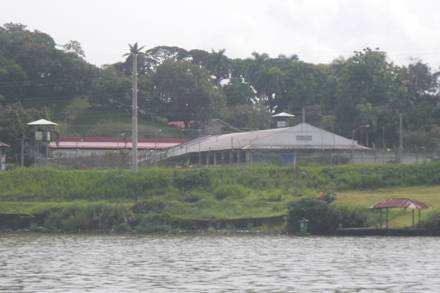
La Renacer prison – Hello, Señor Noriega!
As we
approached the final two locks at Miraflores, Carol rang her sister, Pen, in
Pembrokeshire so that she could get a glimpse of Arnamentia on the webcam. It was thrilling to hear that she was
able to spot us.
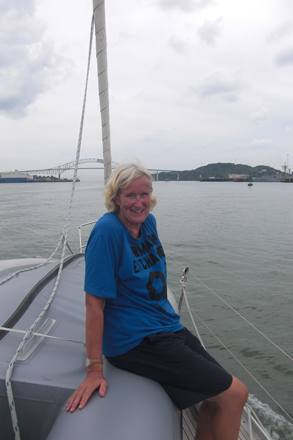
Carol having completed her line handling duties and relieved
to be through the canal in one piece!
Bridge of the Americas in the
background.

At
last we made it through the final locks and took up a buoy at the Balboa Yacht
Club where there is a fine view of the Bridge of the Americas
(above). Where to find a mechanic to sort out Mr
P’s problems? Not an issue. The excellent David Carter who manages
the yacht club facilities despatched his mechanic, Carlos, within the hour. Diagnosis took about 5 minutes (don’t
professionals make you sick?). The
raw water pump was leaking slightly – not a question of a loose bolt or so – a
rebuild job. So, it was drawing in
air and not enough water to keep Mr P adequately chilled. No real problem – of course we’ve got a
spare. Harry spankers new. The pump is held on by 4 bolts so
removal is a 3 minute job.
Actually, it’s a two hour job because, obviously, the least accessible
bolt refuses to come quietly and resists arrest. It’s aided in its endeavours by the fact
that some bird brain (not me, Squire, honest) has previously managed to remodel
its head from being an octagon to being a near perfect circle. But, hey, Carlos is a professional
mechanic and knows that there is no higher authority than him. He knows all the snazzy and elegant
techniques and that the one required here involves a spanner one size too small
and a big hammer. He also knows
precisely where to get the pump he removed rebuilt and having fitted the new
one, re-appeared a couple of hours later with the original as good as new. Spares box reconstituted. Well done the Balboa Yacht
Club.
We’ll
be in Panama for a few more days doing the
final provisioning not only for the week long passage to the Galapagos but also
the three week one from there to the Marquesas. Vegetables won’t last as long in
the tropics as they did on our Atlantic
crossing so there are already lots of tins on board whose blandness will be
enlivened by a dash or two of West Indies Hot Sauce. And we won’t be able to have fresh fruit
for breakfast, so it’ll be Corn Flakes and UHT milk – yum!!








